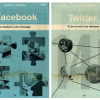Social media, besides serving as an omnipresent factory and distribution center for immaterial labor, also supplies a scoreboard by which we can track our performance in the attention economy—number of Twitter followers, number of comments on a recent Facebook update, number of reblogs on a Tumblr post, et cetera. Because there are so many options, we can cycle through them in search of micro-validation.
In accordance with the tenets of the gamification of everyday life, the scorekeeping stokes our will to participate, making sociality competitive and thus more efficient. One scores points by devising new ways to gain attention and by enhancing the value of various other branded goods (including one’s friends, who in social media have become brands themselves). We are goaded into devising new ways to deploy our identity in social media, adopting the expedient model of broadcasting ourselves for our audience to consume at its convenience. We regard the ocean of affirmations prompted by social media as mere currency rather than emotional sustenance.
The pursuit of reputational capital, measured in connections, clicks, affirmations, and other actions captured online, sustains users’ productive curiosity in the face of a surfeit of potentially meaningless, futile choices. With each choice tallied, accelerated consumption seems extra efficient rather than corrosive to identity. Since sharing is a processing mode that feels like mastery, users are encouraged to shed any vestiges of market anonymity for full-blown self-revelation, which social networks return to us as affirmation and affect, confirming our capability to produce cool. (via The New Inquiry – Social Media, Social Factory)
